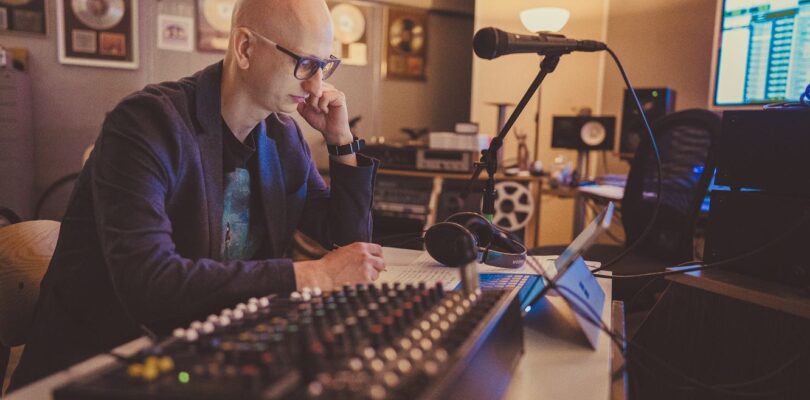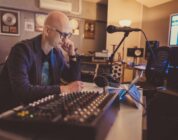This is the English language version of an interview initially conducted in Polish by Piotr Sikorski.
A little bit more than two weeks ago we published the first part of our interview with composer Piotr Musiał. Today’s time for part two – grab some tea or coffee!
The first game featuring your music that I’ve encountered was This War of Mine. It’s largely the soundtrack’s great atmosphere that glued me to my laptop for hours. Even now, when I’m playing the tabletop version of it I still play your compositions on speakers. How would you describe the Piotr Musiał of 2014 versus the Piotr Musiał of 2020? What was your journey from the fantastic This War of Mine to the internationally successful Frostpunk?
The TWoM soundtrack is a very personal project. I learned to play the guitar specifically for it. Well, „learned” is a strong word, but all the guitar parts were recorded by me. The game’s raw style and heavy themes quickly suggested that the music should be just as raw, and amateurish guitar sounds fit that concept perfectly.
After that there was the trailer for TWoM: The Little Ones, in which my then-months old son had a chance to play a few sounds. It’s small things like that, ones that few people know about, that leave so many positive emotions behind and make you remember a project fondly.
TWoM showed me that I can share these emotions with others through music for games and that players are very graceful listeners. I think it was a breakthrough project for me, not only for its success, but also because it taught me to trust my instincts and allow myself to surrender to them, even if it sometimes feels risky.
I personally think you should take those risk as often as you can, since it seems to be working. An integral part of such an approach seems to be a constant stream of motivation and creativity. How do you make sure you never run out of it during a day’s work?
I try to strike a balance and degauss after work. I spend a few hours with my kids and my brain turns into cotton candy. Mission accomplished. In the morning I start fresh. Or rather after a few hours with my kids, so in reality my brain stays as cotton candy until I slide the key into my studio door.
But seriously, most projects are inspiring and motivating on their own. If I don’t have anything concrete to do (which lately is a luxury), I wait until I’m bored with procrastination and the inspiration comes on its own.
If I have artist’s block and nothing works, then I don’t do as many other composers I spoke to. That is, I don’t go for a walk, I don’t paint landscapes, assemble models or listen to podcasts. I sit and I mess around until something comes out. Often it just takes time for my brain to wind up. Other times I just have too many options to choose from and it blocks me, because I think everything is quite „meh”. Quite often all it takes for me is to just accept this and work harder on what I already got.
Composing is a bit like doing jigsaw puzzles. Sometimes you don’t know where to start, other times you’ve no idea where you’re going. But once you lay a few pieces down and try hard, you’ll slowly get there.
I have one more trick which always helps me. I like to just leave something to finish up for tomorrow. So if I have a minute of music ready at the end of the day and an idea what to do next, but no time to develop it – I just quickly sketch that part. The next day I’ll start by working on what I’ve drawn up and I’m back to yesterday’s flow.
Interesting comparison to jigsaw puzzles. What in your career so far has been the biggest challenge for you when it comes to such „puzzle solving”?
This entire musical journey of mine is one giant life challenge, but I say that very positively. From buzzing and plucking through music schools, college, then looking for a start in film, gamedev – it’s all been an adventure.
But there is one petty thing that still challenges me. When I walk on the orchestral stage at first rehearsal or recording, the conductor introduces me and asks me for a few words to the musicians. Such dumb stress and then I don’t even remember what I even said. But I accept these challenges. Hopefully one day it’ll become natural.
If you could move back in time, to what moment of your life would you rewind? Of course please explain!
I definitely would want to relive the Witcher 3 concert at the Kraków Film Music Festival and the Polish game music performance in Shanghai from 2019, which included a Frostpunk suite. It’s really beautiful to do something this fun with such fun people for such a fun audience. These experiences stay with me for a long time and give a massive energy boost for other activities. And then you’re wistfully back at home with your kids and an hour later – your brain’s cotton candy, haha.
Since you’ve mentioned The Witcher, please tell me how you remember your cooperation with Marcin Przybyłowicz and Mikołaj Stroiński? What has surprised you the most?
I was surprised by how fun and open it was. After a short brief I had almost complete freedom. And it so happened that unlike the „vanilla” game, „Blood and Wine” was entirely up my alley. It very much helped that before I was invited, I’ve orchestrated Marcin and Mikołaj’s music for „The Witcher 3”, so I learned the basics of their style. This made it much easier to fit into it later.
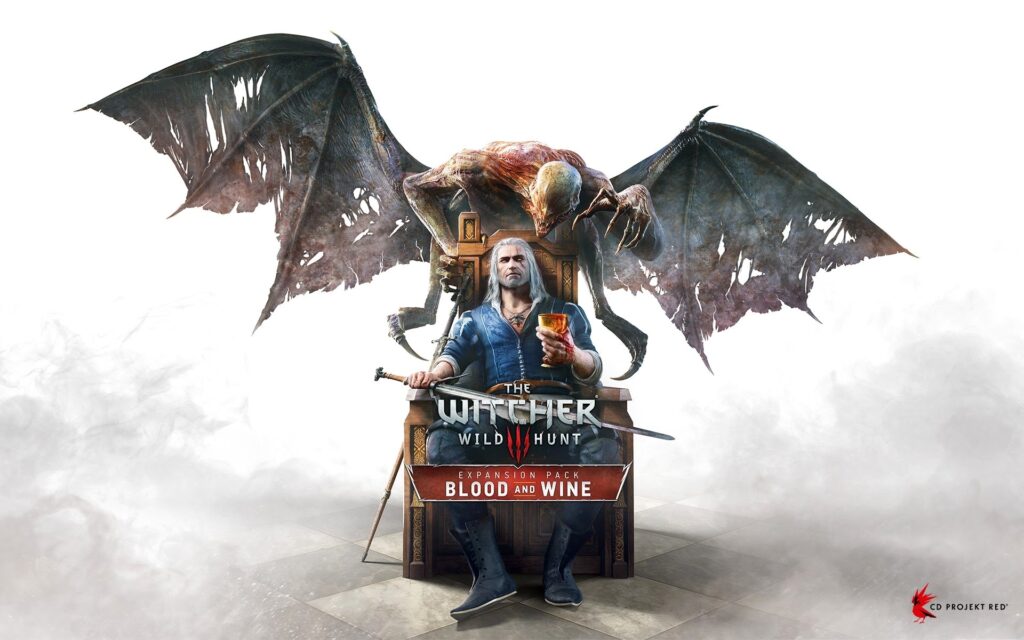
And I have to say that entering a project which already has a very precise musical aesthetic can be quite the challenge. I was very anxious about it initially, but I like being challenged like this and I found a rhythm quickly.
Is there anyone you try to emulate, whom you would call your idol?
That’s a question that pops up often :). I just love music, while at the same time listening to very little of it. And when I do I listen like a musician, so I do so more analytically, which can be both an amazing pleasure and just a curse.
You can find something inspiring or intriguing in any genre. I count John Williams, Jerry Goldsmith and Maurice Ravel as some of the composers who’ve accompanied me for years and never stopped intriguing me. Still, I believe that there’s so much interesting and varied music in the world that it would be a sin to just stick to one style or author. I’d rather take something from all that variety and build something closer to whatever’s playing inside me.
What can you say about the current situation in the games industry from the point of view of a composer? What are the biggest challenges you have to struggle with currently?
We live in interesting times in which fully interactive/adaptive, or even generative music in games is becoming an important trend. To be honest, I am not 100% on board with the concept. That is, I absolutely admire the works of Wintory, Deriviere or Cocker, but my experience is almost entirely based in what is essentially linear music. At the same time, I would separate adaptivity and interactivity in music, where the former allows a sort of „vertical” switching between, say, exploration and combat tracks through short bridges (like The Witcher 3), while the latter is based in a complicated „horizontal” fragmentation. So if we’re outside of combat, the game plays a 15 second loop, but if we pick up an item nearby, it goes to another loop, which will play until you draw a sword.
This interactivity seems completely justified in some genres (Wintory’s „Erica”), but in my opinion most games will benefit from freedom in their music. Look at it like this: if we have a full script for the music, we can paradoxically make the player’s experience just flat. If we compose music according to a script, we only serve up the player with what we draw ourselves, thus limiting the space for the player’s own thoughts and feelings. Which is something I think is key in games. Seems to me that this dose of musical consistency, but also randomness provided by linear music (whether it’s adaptive or not) which grants the player some space for their own feelings is an adequate argument to continue in this direction.
But it’s possible I’ll change my mind someday.
What are you working on right now?
I’ll admit that this year has been quite busy. As for the freshest things from the past few months:
I’ve just finished my work on the TV series „Penny Dreadful: The City of Angels”, to which I’ve composed some of the music as an additional composer.
I also had the chance to create concept music to a vertical slice of a game in a very famous IP, but I can’t reveal the title. The game is currently in its early stages, so any official info will arrive in 2021 at the earliest.
I also added some of my own music to the Korean games „Blade & Soul” and „Aion”.
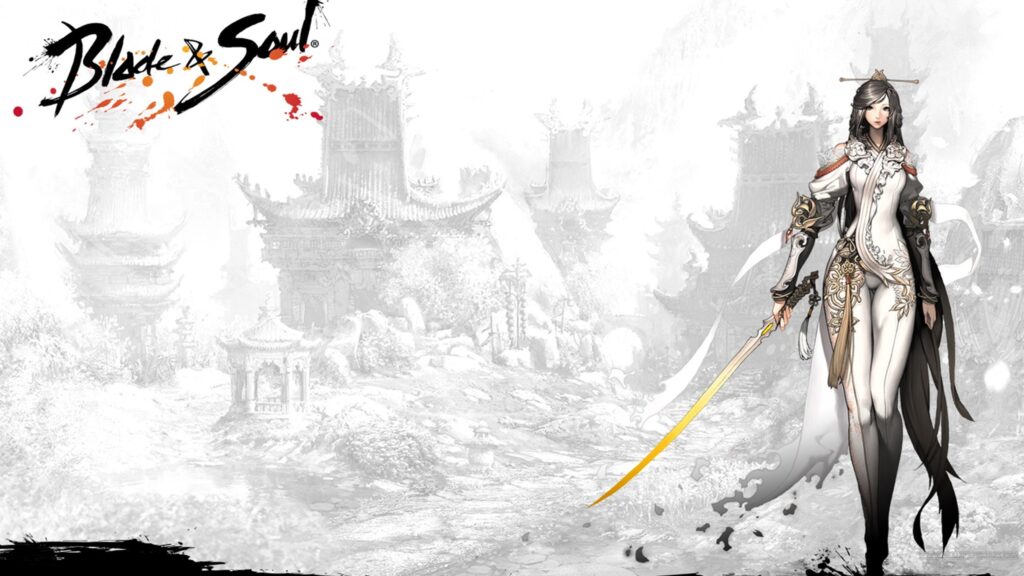
I think I can say now that I’m working on the music for Frostpunk’s final DLC – „On the Edge”. There will be a few new musical ideas there. Who knows, maybe we’ll hear a new main theme, just like in „The Last Autumn”? The expansion is launching soon. I think fans of the original’s music will be pleased.
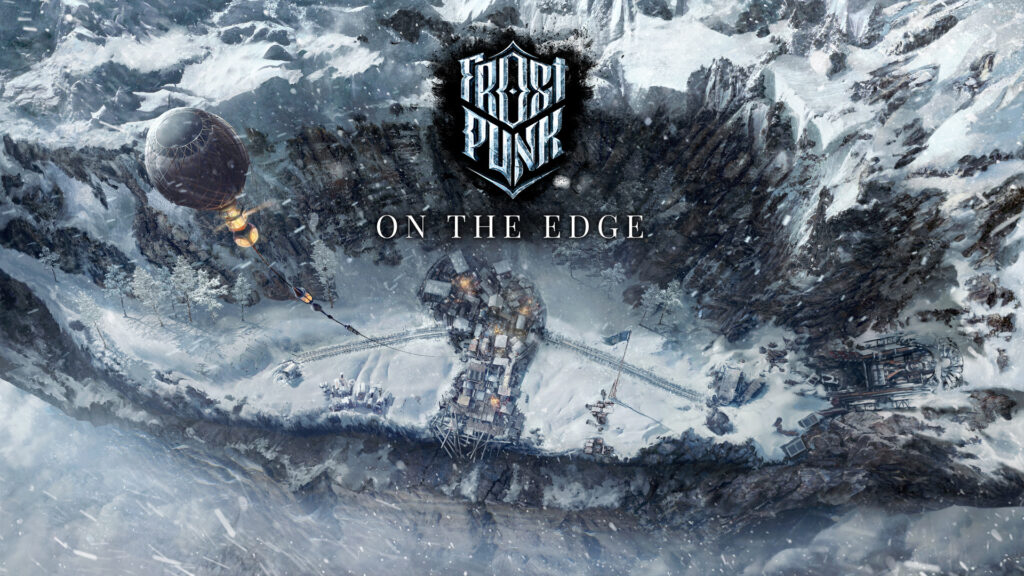
The life of a media composer can be very sad, because I can’t openly admit what’s going on and give you some excitement. But I have at least one more game planned for this year and I expect surprise projects on the way.
What hardware lets you unleash all that creativity to handle so many varied projects? Please, describe your studio.
I currently live in a flat. Its attic used to host a laundry, about 12 square metres. There was a 50-years old bathtub here, a gas furnace for heating the water and there was also a hole in the floor serving as a drain. I got to rent and adapt this place into a studio and it’s been my favorite creative space the past few years.
I have this giant, but still too small desk here, where I keep a ton of stuff that’s hard to enumerate in its entirety, not to mention it wouldn’t be particularly exciting to most readers. I work on a fairly powerful PC (i9 14 core, 128GB RAM, a LOT of SSDs) with Cubase and Sibelius. I’ve 3 screens – a 32-inch in the middle, a 24-inch one on the side (for the mixer/score), the wall above my central monitor hosts a 32-inch TV I use for video.
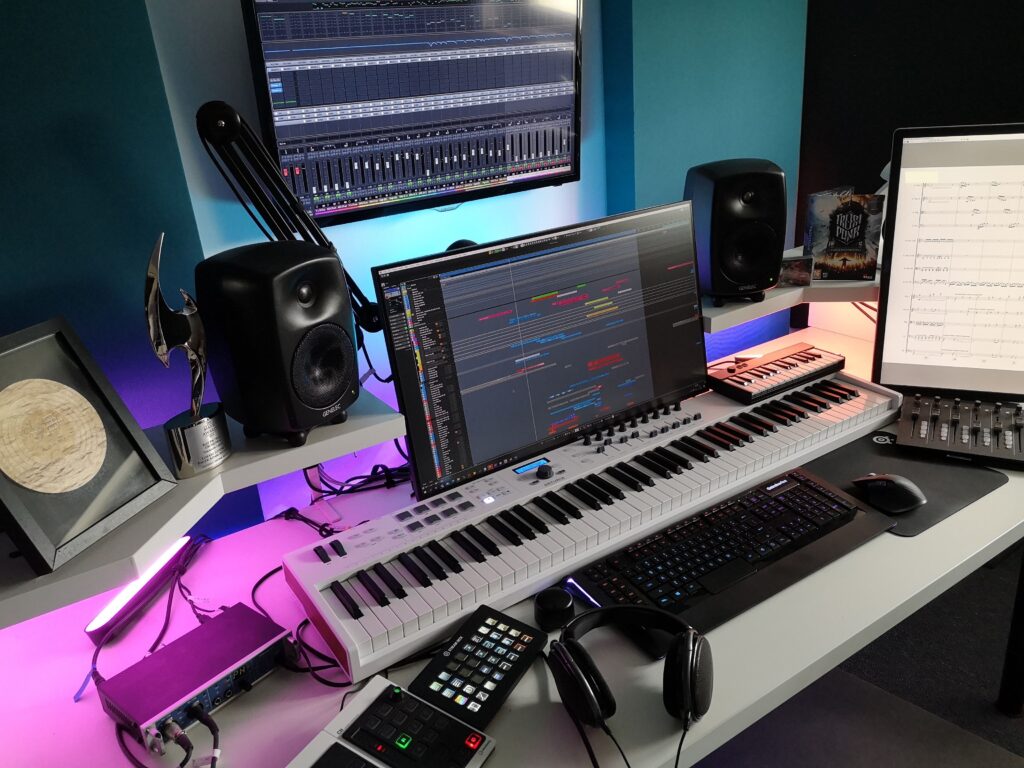
My playback equipment is Genelec 8330A with the SAM system, which adapts to the acoustics of my room. But I spend most of my time on headphones anyway, Sennheiser HD650 to be specific. I compose, mix and then check everything on them.
I think I’ll get myself a digital piano here this year too.
What music do you listen to? Recently a list of 10 albums which shaped one’s music taste was popular on Facebook. How does your top look like?
I am a dead end for such topics :). I just practically don’t listen to music just to listen to it. But I can dive into my past and it would go something like that:
Elvis Presley (my first tape I got from my parents)
Rod Steward (generally)
Queen
Roxette
Tytus Wojnowicz
Then it went into a bit more serious direction:
Romeo & Juliette (1996)
Waterworld (J.N. Howard)
Walk Away (jazz)
Poluzjanci
The further we’d go, the less concretes would appear. The more I create, the less I listen to.
And to finalize with a question that usually appears in our interviews. What does it mean to you to be a settled down gamer? Would you count yourself as one? Do you have the time to play anything?
A „settled down gamer” reminds me of the sterotypical image of a dad sitting down at the console in the living room with his son. Or maybe with someone who will choose a single player, more mature game over competitive multiplayer. It’s someone who can admire games as a medium, an artform. But also knows when to set the pad down.
I like to make breaks in my work to play some Heroes of the Storm. I also reach for other games, usually way past launch. I like strategies a lot (Starcraft, Civilization), or the Borderlands series. I don’t like games where I feel very much that I’m playing a game. But I’ve taken a liking to narrative games and walking sims. I’m finishing up Quantic Dream’s series of titles right now. You could say I’m starting to settle down. I’m definitely getting older, because easy mode is pretty much my default in most games. I’m waiting for the moment when my son grows up enough so I can finally form that sterotypical image with him.
Piotr, thank you very much for this massive interview! Good luck with all your current and future projects!

